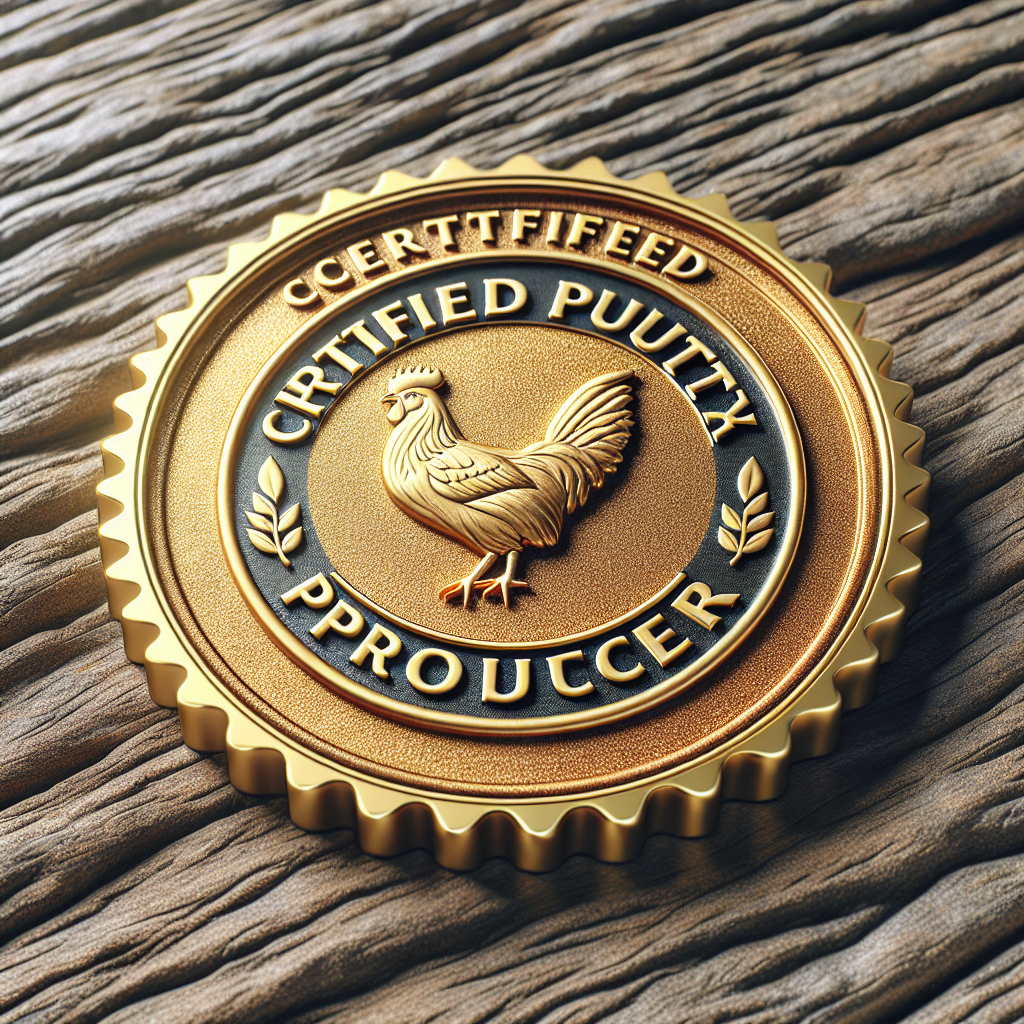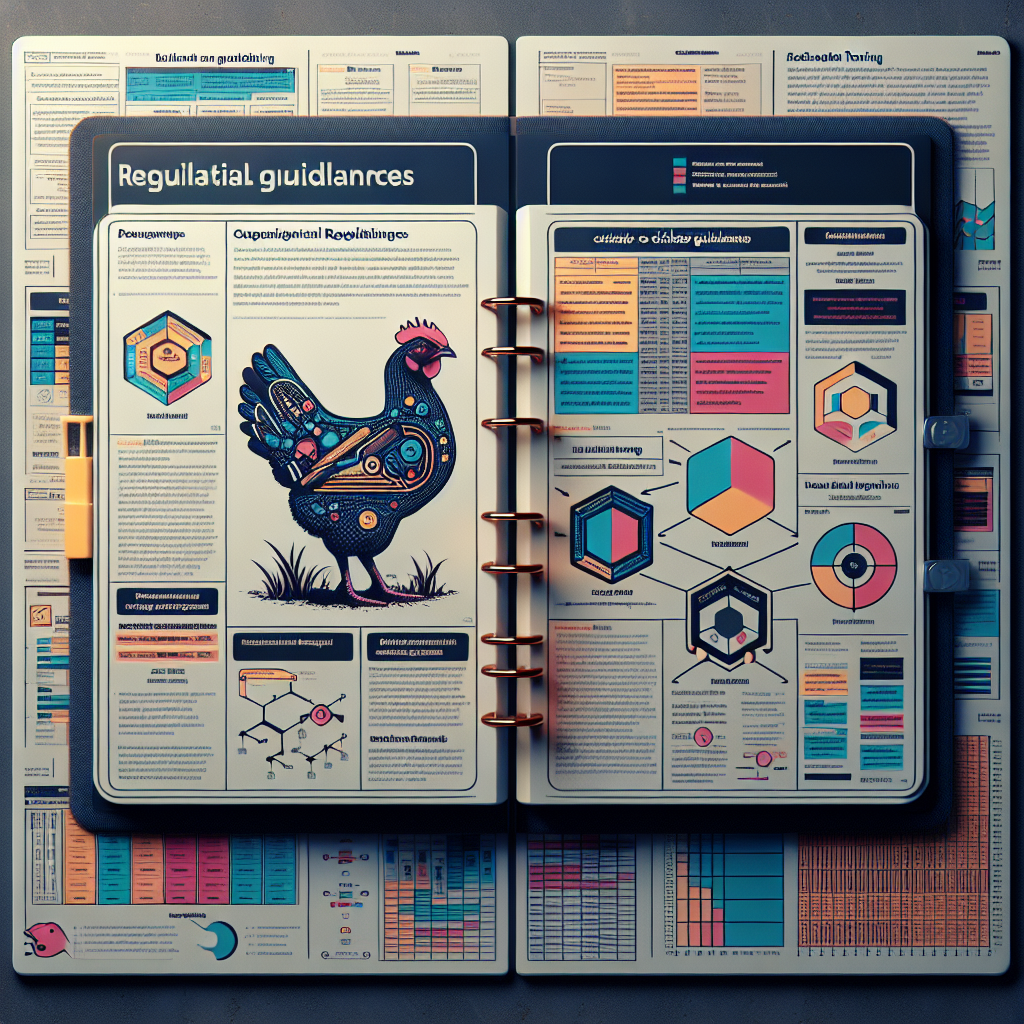Are you a poultry farmer looking to stay compliant with regional and national regulations? It’s crucial to ensure that your farm operates within the guidelines set by the authorities to guarantee the health and safety of your flock and consumers. This article will provide you with valuable insights and practical tips on how to navigate these regulations successfully, enabling you to run your farm smoothly while meeting all necessary requirements.
Understanding Regional Poultry Regulations
When it comes to poultry farming, understanding and complying with regional regulations is crucial for maintaining a successful and legally compliant operation. To ensure that your farm adheres to these regulations, conducting thorough research on local poultry regulations is essential. Each region may have specific requirements, such as zoning restrictions, permits, or guidelines for poultry housing and waste management.
Identifying the key regional regulatory bodies is another important step in ensuring compliance. These bodies may include local departments of agriculture, environmental agencies, or health departments. Establishing a good relationship with these entities can provide valuable guidance and support in navigating the regulatory landscape.
Once you have researched and identified the local regulations, comprehending and meeting regulatory requirements is vital. Familiarize yourself with the specific rules pertaining to your region, such as the maximum number of birds allowed per farm or the standards for farm infrastructure. Understanding these requirements will help you ensure compliance and avoid any potential legal issues.
Complying with National Poultry Regulations
While regional regulations may vary, it is also imperative to stay updated with national poultry laws. National regulations establish overarching standards that must be adhered to in addition to any regional guidelines. Keeping yourself informed about any changes in national regulations will help you maintain compliance and protect the reputation of your farm.
Familiarize yourself with the national regulatory agencies responsible for overseeing poultry farming. These agencies might include the Department of Agriculture, the Food and Drug Administration, or the Environmental Protection Agency. Building a relationship with these agencies can provide you with access to valuable resources, training, and updates on regulatory changes.
In addition to staying informed, following proper documentation and reporting procedures is essential for complying with national regulations. Keep detailed records of farm operations, including flock management, feed purchases, and veterinary care. Documentation should also include any incidents or issues that arise, as well as any actions taken to resolve them. By maintaining accurate records, you can demonstrate your commitment to compliance and respond effectively to any regulatory inquiries.
Establishing Farm Infrastructure and Facilities
Designing farms according to regulatory standards is crucial to ensure the well-being of poultry and compliance with regulations. Familiarize yourself with the specific requirements for poultry housing, including factors such as minimum space per bird, ventilation, and lighting. Adhering to these standards will promote the health and productivity of your flock.
Proper waste management is another critical aspect of farm infrastructure. Understand and implement the guidelines for handling and disposing of poultry waste to minimize environmental impact. This may involve using proper manure storage facilities, ensuring appropriate distancing from water sources, and following established disposal protocols.
Implementing biosecurity measures is essential for protecting the health of your poultry and preventing the spread of diseases. Biosecurity practices commonly include restricting visitor access, maintaining controlled entry points, disinfecting footwear, and implementing strict sanitation protocols. By effectively implementing biosecurity measures, you can prevent the spread of diseases and safeguard the integrity of your farm.
Farm and Equipment Hygiene
Maintaining cleanliness in poultry houses is vital for the health and well-being of your birds. Regularly clean and sanitize poultry houses to remove any potential disease vectors. This includes removing old bedding, disinfecting surfaces, and ensuring proper ventilation to minimize moisture and ammonia levels. By keeping your poultry houses clean, you create a healthier environment, reducing the risk of disease transmission.
Poultry equipment and utensils also require regular sanitization to prevent the spread of pathogens. Develop a proper cleaning and sanitization schedule for equipment such as feeders, waterers, and egg collection systems. Ensure that all equipment is thoroughly cleaned and sanitized between uses to maintain hygiene standards and reduce disease risks.
Proactively monitor and prevent the spread of diseases within your flock. Implement measures such as regular health checks, vaccination programs, and quarantine protocols for new birds or sick animals. By diligently monitoring the health of your poultry and taking appropriate actions to prevent the spread of diseases, you can ensure their well-being and maintain compliance with regulations.
Poultry Quality and Safety Management
Monitoring and maintaining poultry health is crucial for meeting quality and safety standards. Regularly observe your flock for any signs of illness or distress and promptly address any issues. Implementing a veterinary care program and seeking professional advice for any health concerns is essential to ensure the health and well-being of your birds.
Implementing a comprehensive vaccination program is an effective preventive measure to protect your flock from infectious diseases. Consult with a veterinarian to develop a vaccination schedule that aligns with regional and national guidelines. By vaccinating your birds regularly, you can minimize the risk of disease outbreaks and maintain compliance with regulations.
Adhering to food safety standards is essential for ensuring the quality and safety of poultry products. Implement proper handling and storage procedures to prevent contamination and cross-contamination. Educate and train your staff on best practices for food safety, including proper hygiene, temperature control, and appropriate packaging. By adhering to food safety standards, you can ensure that your poultry products are safe for consumption and meet regulatory requirements.
Animal Welfare and Husbandry Practices
Providing adequate housing and space requirements is essential for the welfare of your poultry. Familiarize yourself with the regional and national guidelines for minimum space per bird and ensure that your farm meets or exceeds these requirements. Proper ventilation and lighting are also crucial for the well-being of your birds, as they promote air quality, reduce stress, and support healthy growth.
Implement ethical farming practices by prioritizing the welfare of your birds. Train your staff in proper animal handling techniques to minimize stress and injuries during routine tasks such as catching, moving, and transportation. Provide enrichment activities to promote natural behaviors and mental stimulation for your birds. By prioritizing animal welfare, you create a healthier and happier flock while meeting regulatory standards.
Poultry Feed and Nutrition Management
Understanding the composition and nutrition requirements of poultry feed is crucial for maintaining the health and productivity of your flock. Educate yourself on the nutritional needs of different poultry species and age groups. Ensure that your feed formulation meets or exceeds these requirements to promote optimal growth and development.
Source feed from approved suppliers who meet quality and safety standards. Regularly check the quality of feed ingredients and finished feed to prevent contamination or adulteration. Establish good relationships with feed suppliers and verify their compliance with regulatory standards. By sourcing feed from reputable suppliers, you can provide your birds with safe and nutritious feed while meeting regulatory requirements.
Prevent contaminations and adulteration of feed by implementing proper storage and handling procedures. Store feed in clean, dry, and well-ventilated areas to prevent mold growth and pest infestation. Regularly inspect and clean feed storage facilities to maintain hygiene standards. By ensuring the quality and safety of your feed, you can protect the health of your flock and maintain compliance with regulations.
Record Keeping and Documentation
Maintaining complete and accurate records is essential for demonstrating compliance with regulatory requirements. Keep detailed records of all aspects of your farm operations, including flock management, feed purchases, and veterinary care. Document the dates, quantities, and sources of your feed purchases.
In addition to general farm operations, document your biosecurity and vaccination procedures. Record the dates and details of any biosecurity measures implemented, such as visitor restrictions, sanitation protocols, or disease testing. Document your vaccination program, including the vaccines used, dates administered, and the individuals responsible for vaccination.
Record the health status of your flock, including any illnesses or injuries, and the actions taken to address them. Keep track of any medication usage, including the type of medication, dosage, and withdrawal periods. By maintaining meticulous records, you can provide evidence of your compliance with regulations and effectively respond to any regulatory inquiries or audits.
Employee Training and Education
Educating your staff on regulatory standards and policies is essential for maintaining compliance on your farm. Ensure that all employees are familiar with the regional and national regulations that govern your operations. Provide training sessions or workshops to ensure their understanding and compliance with these regulations.
Train your employees in proper animal welfare and handling practices. This includes techniques for gentle and stress-free handling, recognizing signs of distress or illness in birds, and understanding the importance of biosecurity measures. By equipping your staff with the necessary knowledge and skills, you create a team that is capable of maintaining compliance and promoting the well-being of your flock.
Provide ongoing education and development opportunities for your employees. Stay up to date with industry advancements and changes in regulatory standards and share this knowledge with your staff. Encourage participation in workshops, conferences, or online courses that focus on poultry farming best practices and regulatory compliance. By investing in the ongoing education and development of your employees, you ensure that your farm stays current with regulations and industry trends.
Regular Inspections and Audits
Regular inspections and audits are essential for ensuring compliance with regional and national poultry regulations. Conduct internal audits and self-assessments to identify any potential non-compliance or areas for improvement. Regularly review your farm operations, recordkeeping practices, and biosecurity protocols to ensure they align with regulatory requirements.
Participate in external inspections and audits conducted by regulatory bodies or certifying agencies. Be prepared for these inspections by keeping your farm organized, records updated, and staff trained. Address any non-compliance issues promptly, taking the necessary actions to rectify the situation and prevent recurrence. By actively participating in inspections and audits and addressing any issues, you demonstrate your commitment to compliance and continuous improvement.
In conclusion, ensuring compliance with regional and national poultry regulations requires a comprehensive understanding of the requirements and a commitment to implementing and maintaining proper protocols. By conducting thorough research, staying informed, and following best practices, you can create a successful and legally compliant poultry farming operation. Prioritizing the health and well-being of your flock, implementing proper infrastructure, and maintaining accurate records will not only ensure compliance but also promote sustainable and responsible farming practices.




